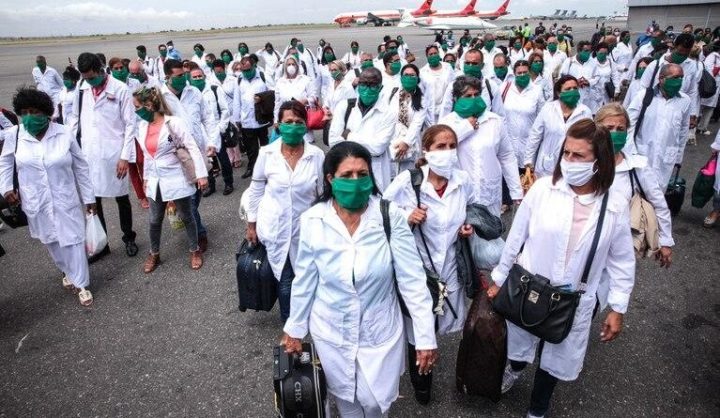Dear members of the Norwegian Nobel Committee,
Dear Mrs. Berit Reiss-Andersen, Chair
We address you in a time of great challenges for humanity and also a time of the greatest need for solidarity. The COVID-19 pandemic is yet another instance of how essential international solidarity is in the promotion of a just peace and the alleviation of people’s suffering during emergencies. And it is in this sense that we see as the most sincere example of such international solidarity the work that the Cuban medical contingent “Henry Reeve” has been performing since much before the coronavirus outbreak was announced. That fact leads us to urge you to acknowledge how valiant and exemplary the group’s endeavor is by endowing it the Nobel Peace Prize.
The various Cuban medical groups currently work saving lives in 24 countries in Latin America and the Caribbean; 27 African countries; 2 in the Middle East and 7 in Asia. They have been bringing people humanitarian medical assistance for about 60 years, in a long lasting Cuban tradition of humanist care for other peoples which is carried out even in the face of dire economic challenges for the Island, which suffers from the extremely harsh sanctions that, in a stark contrast with Cubans’ disposition, also lasts over six decades and impose grave hardships on the Cuban people. Still, Cubans have overcome this barrier to show the world how best to build peace and bridge, so that other peoples may have the chance to overcome their own challenges and not lose their lives before they accomplish that. The Cuban brigades have worked in countries such as Peru, in the aftermath of the 1970 devastating earthquake that killed 80,000 people and displaced thousands of families (note that Cuba and Peru did not have diplomatic relations and still, the former has sent assistance); in Haiti, during the cholera crisis; in various African countries, fighting Ebola; and Latin America and the Caribbeans, with a wide range of programs that helped thousands of people.
The “Henry Reeve brigades”, as the emergency contingent is known, have a gigantic task that only a humanist endeavor could accomplish as it has. This huge challenge is in the designation: the International Contingent of Doctors Specialized in Disaster Situations and Serious Epidemics.The contingent was launched in 2005 and named in honor of a young US activist who decided to join Cuba’s Liberation Army in solidarity with the Cuban’s struggle for independence. In about 28 brigades sent to 22 countries since its creation, more than 7,950 professionals have worked to surmount the effects of 16 floods, eight hurricanes, eight earthquakes and four epidemics. In the fight against COVID 19, the ever brave Cuban physicians promptly headed to several countries, including Italy, which was in March 2020 amongst the hardest hit by the outbreak. The brigades were requested by the governments of countries such as Venezuela, Nicaragua, Italy, Suriname, Jamaica, Granada, Andorra, Saint Kitts and Nevis, Haiti, Dominica, Belize, Saint Vincent and the Grenadines, Saint Lucia, and Antigua and Barbuda.
There are 14 such brigades working with over 500 specialized doctors and other health professionals, valiant men and women who have been bringing much needed assistance to peoples in various countries and all continents, saving countless lives and showing the humane empathy and kindness for which they remain known wherever they have visited. This work is key in building peace amidst violent and structural conflicts and in setting conditions for people to have their most basic needs met in conditions of disaster and extreme impoverishment. For this principled commitment to peace and solidarity turned into concrete, verifiable action, hence, the brigades are more than qualified for the Nobel Peace Prize.
For that reason, representing dozens of national peace committees in about 100 countries that are members of our World Peace Council, we join countless other organizations, parliamentarians, and diverse peace-loving-people in endorsing the nomination of the Henry Reeve contingent for the Nobel Peace Prize. The WPC is an international non-governmental organization relentlessly promoting peace and opposing wars, with consultative status with the United Nations Economic and Social Council (ECOSOC).
Sincerely yours,
Socorro Gomes
![]()
President of the World Peace Council and former Federal Deputy in the Brazilian House of Representatives.
Thanassis Pafilis

General Secretary of the World Peace Council, member of the Hellenic Parliament






